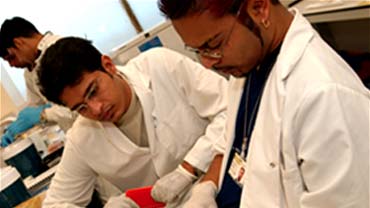Department of Genetics, Genomics and Cancer Sciences
Research training
 We provide every opportunity for our postgraduate research students to develop into mature and independent research scientists, aware of both the basic biological context of and potential applications for their projects, and capable of conducting logical and meaningful scientific analysis by applying a variety of approaches to the problem under study.
We provide every opportunity for our postgraduate research students to develop into mature and independent research scientists, aware of both the basic biological context of and potential applications for their projects, and capable of conducting logical and meaningful scientific analysis by applying a variety of approaches to the problem under study.
All research students undertake a comprehensive training programme that is devised and delivered by the College of Life Sciences and Doctoral College. Topics include laboratory skills (i.e. experimental design and data handling, including basic statistical analysis, safety and good working practice and time management), presentation skills (i.e. scientific writing and poster preparation), career skills (i.e. building a career portfolio, IPR and commercialisation of research and writing a CV), and computing skills (i.e. bioinformatics and IT applied to molecular biology).
Supervision structure
Throughout the duration of your studentship, your supervisor will be responsible for your academic development, and will work with you to develop a mutually-agreed training programme that will best fulfil your career aspirations. You will undertake training in project direction, experimental design and data analysis throughout your three years via regular consultations with your supervisor and other members of academic staff, and in presentations to laboratory groups.
Your supervisor will also be responsible for your specific project-based technical training, and will ensure that you have all the resources and facilities you need to undertake your research project.
A committee of two additional academics and/or senior research fellows will also be appointed to you. They will provide extra support to you and your supervisor by:
- Regularly monitoring progress
- Offering research advice
Research groups
You will be integrated into active and inter-active research groups as a postgraduate researcher. Most groups work in large communal laboratories, an environment which provides ample opportunity for interaction with other research staff. You are encouraged to seek further help and advice when needed from the wider biological and medical sciences community, and to attend and contribute to national and international scientific meetings (for which financial support will be provided). You will be required to participate in and contribute to the regular meetings held by your laboratory groups.
Formal training
Formal training comprises two components:
1. Basic induction in laboratory safety and procedures (compulsory), as well as an ongoing programme of training in particular research techniques (either in your supervisor's own laboratory or in another laboratory as appropriate)
2. Participation in the skills training programme organised by the College of Life Sciences.
With respect to the first component, responsibility for compliance lies primarily with the supervisor (who is also normally the Laboratory Safety Supervisor), though this is checked as part of the process of student progress monitoring. Students are also expected to attend appropriate undergraduate or Masters-level modules to fill in gaps in their knowledge with respect to the research which they are undertaking.
With respect to the second training component, the College of Life Sciences organises a comprehensive programme of training sessions covering wider research and transferable skills which take place primarily during the first year of research degree study. The specific training programme is designed by the student and supervisor on the basis of relevance or experience.
These training sessions include:
- Basic safety, risk assessment, chemical and biological hazards, radiation safety, asbestos, genetic modification
- Bibliographic databases and electronic journals, using bibliographic information software and critical appraisal of retrieved information
- Protein and DNA bioinformatics
- Time management, reading and note-making skills, experimental design
- Data handling and statistics
- Presentation skills
- Research finance
- Protection and commercialisation of intellectual property
- Legal and ethical issues in biomedical research
- Skills for a future career